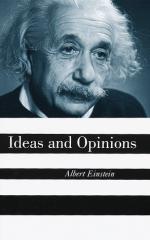
|
| Name: _________________________ | Period: ___________________ |
This test consists of 15 multiple choice questions and 5 short answer questions.
Multiple Choice Questions
1. What happens when religious people insist the Bible is absolutely truth or when scientists render value judgments?
(a) Conflicts arise.
(b) A consensus is reached.
(c) The thesis of each side offers a synthesis.
(d) A new field of science is born.
2. Who does Einstein think is the man least likely to be duped by desires?
(a) Hitler.
(b) The Pope.
(c) Freud.
(d) Churchill.
3. In what year is "Religion and Science: Irreconcilable?" written?
(a) 1940
(b) 1950.
(c) 1948.
(d) 1944.
4. What is the one good thing about the fact that America has heaped so many accolades on Einstein?
(a) That it may help them forgive Germany's excesses.
(b) That it is a sign that America is open minded.
(c) It is a sign that materialism has not completely taken over the minds of Americans.
(d) That it is a sign that Americans value education.
5. Who does Einstein say are now the ones who advocate international thought?
(a) Intellectuals.
(b) Communists.
(c) Politicians.
(d) Pseudo-artists.
6. What has stood in the way of the development of technology in China and India?
(a) Industrial people.
(b) Dense population.
(c) Low technological ability.
(d) Religious intolerance.
7. What governing system does Einstein think is best?
(a) Totalitarianism.
(b) Democracy.
(c) Monarchy.
(d) Democratic monarchy.
8. What is the is the hidden evil power behind nationalism everywhere?
(a) False pride.
(b) Satan.
(c) A lack of clear thinking.
(d) The armament industry.
9. What does Einstein believe will not move humanity forward?
(a) Technology.
(b) Wealth.
(c) Industry.
(d) Hate.
10. What has made international peace a matter of life and death and an ethical imperative for everyone?
(a) Technology.
(b) Religious imperatives.
(c) Waning resources.
(d) The global market.
11. What does Einstein say about the struggle for human rights?
(a) Each person has to choose his own rights.
(b) It is visionary.
(c) It is eternal.
(d) It is illusionary.
12. What does Einstein believe about all profound scientists?
(a) That they are religious, but not religiously naïve.
(b) That they are fooling not only themselves but the public.
(c) That they hold knowledge to a higher standard of verification than is necessary.
(d) That they cannot be trusted.
13. What does Einstein say prompts efficiency and the development of technology in the United States?
(a) The value of the individual in the United States.
(b) The general lazy nature of Americans.
(c) The intellectual prowess of Americans.
(d) The high cost of labor.
14. What has too much influence on public thought?
(a) The press.
(b) The church.
(c) The educational system.
(d) The government.
15. What is one attribute of American research that is giving them an increasing edge in the development of technology over other countries?
(a) Cooperation.
(b) Propriety.
(c) Secrecy.
(d) Selfishness.
Short Answer Questions
1. What three topics are addressed in Part 1?
2. Security through superior military power is what?
3. Whose work shatters the framework of classical mechanics and provides the basis for further research in physics?
4. When are people happiest?
5. What does Einstein say about the League of Nations' Committee of Intellectual Cooperation?
|
This section contains 534 words (approx. 2 pages at 300 words per page) |

|




